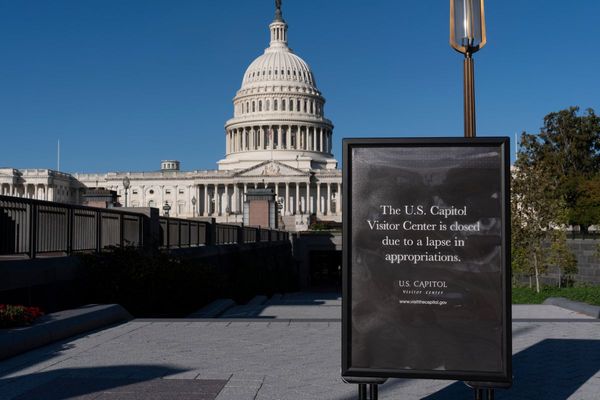Get all your news in one place.
100’s of premium titles.
One app.
Start reading
One app.
Get all your news in one place.
100’s of premium titles. One news app.
inkl
Holly Bodeker-Smith
Under his eye: How governments around the world are ramping up citizen surveillance
A nation state needs to be able to collect data on its citizens to secure their health, safety and survival. Populations have been taught over millennia – dating back to the Roman Census 33/34 AD – that it’s okay to hand their personal information to the powers that be. And most of the time it has been. But as governments around the world ramp up their surveillance of their citizens’ behaviour – from jaywalking to missed debt deadlines – are they crossing a line we never knew the importance of marking out?
With a desire to lead the world in artificial intelligence, in particular facial recognition, China is spearheading the move towards ubiquitous citizen surveillance. Perhaps its most Big Brother-esque measure is the social credit system, whereby artificial intelligence monitors citizens’ behaviour and ranks them with a “social credit” score. This data is banked in a national credit information-sharing platform which, according to China Daily, 71 government departments have access to. In an unprecedented feat of social engineering, the state may then “blacklist” citizens for tax evasion, antisocial behaviour on flights or trying to take a lighter through airport security. They recently named, shamed and banned 169 “severely discredited” people from taking flights or trains for a year for such actions.
Xinjiang in China might already be one of the most surveilled regions in the world, closely behind Gaza. After a series of terrorist attacks across China in 2014, the government blamed Xinjiang-based militants (who they claimed were inspired by international Islamist extremists). Today, citizens of the region, particularly people of the Muslim Uighur ethnicity, are under constant surveillance. The citizens here had their right to privacy taken without consult – they must go through security checkpoints, iris and body scanners to get around; or hand their phones to police on demand for data checking.
When citizens unknowingly give up a ounce of freedom, it becomes easier for governments to take pound. China’s next frontier of mass social surveillance will be a nationwide electronic tracking system on citizens’ cars, to be implemented on July 1. The program will see radio-frequency (or RFID) chips fixed to citizens’ windshields, in what will become a mandatory measure for all new vehicles from January 2019. Reading devices installed along roads will read and record information using these chips – such as a license plate number, car colour, and passage through checkpoints – before passing the data onto the Ministry of Public Security.
Across the Pacific, the US Customs and Border Protection (CBP) will soon start using facial recognition technology at Anzalduas on the Mexico-US border to record images of people in vehicles entering and leaving the US. The Vehicle Face System (VFS) is the first in-car facial recognition system, and will match images of drivers against visa and passport photos that CBP already have on file. While this trial will run for one year from August, the technology has been in the making since January 2016; undergoing original tests in Nogales, Arizona and Anzalduas, Texas in January 2017. It’s just one of the ways the Trump administration is using invasive technology to crack down on immigrants – they just started analyzing decades-old fingerprints with the intention of revoking citizenship from immigrants who may have lied or falsified information on official documents. (Despite this major crackdown, illegal crossings at the US-Mexico border are swelling.)
Australians are also looking down the barrel of increased surveillance. The government is set to start using facial recognition technology that matches faces against CCTV footage for use in criminal investigations later this year. Last October the Council of Australian Governments agreed to grant Federal and state police real-time access to images from passports, visas, citizenship documents and driver licenses – which they’ll will use in conjunction with facial recognition to locate criminal suspects. (In the US, dozens of law enforcement agencies already use such technologies to match photos against databases of mug shots or driver’s license photos.) Though Australian bodies are wary of taking it too far, the Law Council of Australia president Morry Bailes warning against the measure devolving into a system of “broad social surveillance” not unlike China’s social credit system. An ounce for a pound, people. / Public surveillance and citizen data collection in a democratic society begs the question: were we asked?
It’s easy to mistake governments’ invasive data collection as a protective measure, particularly when there’s the ability to opt-out. Japan will soon roll out “information banks” – which store personal information such as online shopping and use of electronic money – as part of its move towards a cashless society. According to The Japan News, individuals need to give consent for this data to be collected and provided to private companies. Not dissimilarly, Australians can opt out of MyHealth – a national system whereby citizens’ health records will be uploaded onto a national electronic database. Though if a 2016-17 third party hack on My Health Records is anything to go by, it’s clear the government will have to be hyper-vigilant with protecting this information.
Part of that will include giving citizens access to and control over their personal data – whether its held by a public or private entity. This was one measure enacted by the EU’s recent General Data Protection Regulation (GDPR). A response to the Facebook scandal – which saw millions’ of users’ data sold to now-defunct firm Cambridge Analytica – the GDPR was a sweeping attempt to regain control over individuals’ information from large-scale companies. It ruled that EU citizens will have a right to see and correct the data that companies have on them, or be forgotten online completely. It’s widely expected that other nations will follow the GDPR, and some nations have already enacted data protection measure. In Estonia, a central intelligence agency protects citizens’ data from companies through a cryptographically secure universal ID. The power of this measure is that it gives Estonians control over their data; they can view a paper trail of anyone who has accessed or altered their medical records. (Note: non-Estonian residents can also become “e-residents” and gain many of these online privileges).
There are already some signs of citizens and civil liberties bodies fighting for people’s rights to freedoms in public (in the UK police are facing legal action over the use of facial recognition cameras). Though it’s evident that we can’t leave it to large bodies like the EU to step in when private companies and governments alike overstep our collective right to privacy. This week a US spy warned people travelling to the World Cup against taking their devices, for fear that they could be hacked by Moscow’s cyber spies. Though now more so than ever it’s important for us to be wary not just of the distant, ominous hacker but the governments that overlook us.
Holly Bodeker-Smith is a freelance journalist and editorial intern at inkl.
Sign up to read this article
Read news from 100’s of titles, curated specifically for you.
Already a member?
Sign in here
Top stories on inkl right now
One subscription that gives you access to news from hundreds of sites
Already a member?
Sign in here
Related Stories
Top stories on inkl right now
One subscription that gives you access to news from hundreds of sites
Already a member?
Sign in here
Our Picks







